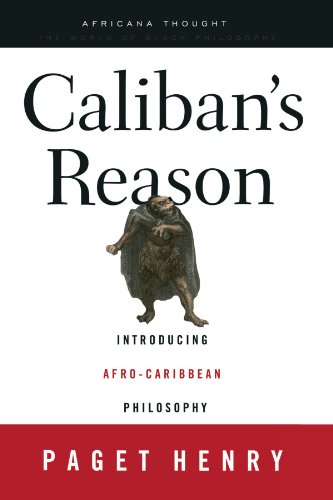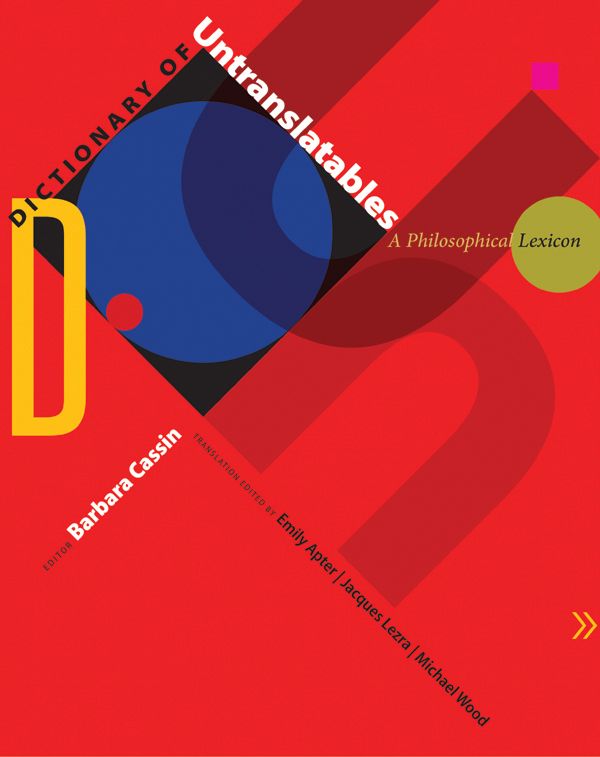Paget Henry: Caliban’s Reason: Introducing Afro-Caribbean Philosophy (2000)
Filed under book | Tags: · africa, caribbean, colonialism, consciousness, epistemology, existentialism, historicism, history of philosophy, knowledge, marxism, ontology, philosophy, poeticism, poststructuralism

“Caliban’s Reason introduces the general reader to Afro-Caribbean philosophy.
In this ground-breaking work, Paget Henry traces the roots of this discourse in traditional African thought and in the Christian and Enlightenment traditions of Western Europe. Since Afro-Caribbean thought is inherently hybrid in nature and marked by strong competition between its European and African orientations, Henry highlights its four main influences–traditional African philosophy, the Afro-Christian school, Poeticism and Historicism–as his organizing principle for discussion.
Offering a critical assessment of such writers as Wilson Harris, Derek Walcott, Edward Blyden, C.L.R. James and George Padmore, Caliban’s Reason renders a much-needed portrait of Afro-Caribbean philosophy and fills a significant gap in the field.”
Publisher Routledge, 2000
Africana Thought series
ISBN 0415926459, 9780415926454
xiii+304 pages
Reviews: H. Adlai Murdoch (SubStance, 2002), Claudette Anderson (Small Axe, 2002), Charles Mills (Phil Review, 2003), Clevis Headley (Int’l J of African Hist Studies, 2003), Leslie R. James (North Star, 2004).
Interview with author (Linda Martín Alcoff, 2003)
Comment (0)Peter K. J. Park: Africa, Asia, and the History of Philosophy: Racism in the Formation of the Philosophical Canon, 1780–1830 (2013)
Filed under book | Tags: · africa, asia, china, egypt, empiricism, history of philosophy, idealism, india, pantheism, persia, philosophy, race, racism, religion, science

“A historical investigation of the exclusion of Africa and Asia from modern histories of philosophy.
In this provocative historiography, Peter K. J. Park provides a penetrating account of a crucial period in the development of philosophy as an academic discipline. During these decades, a number of European philosophers influenced by Immanuel Kant began to formulate the history of philosophy as a march of progress from the Greeks to Kant—a genealogy that supplanted existing accounts beginning in Egypt or Western Asia and at a time when European interest in Sanskrit and Persian literature was flourishing. Not without debate, these traditions were ultimately deemed outside the scope of philosophy and relegated to the study of religion. Park uncovers this debate and recounts the development of an exclusionary canon of philosophy in the decades of the late eighteenth and early nineteenth centuries. To what extent was this exclusion of Africa and Asia a result of the scientization of philosophy? To what extent was it a result of racism?
This book includes the most extensive description available anywhere of Joseph-Marie de Gérando’s Histoire comparée des systèmes de philosophie, Friedrich Schlegel’s lectures on the history of philosophy, Friedrich Ast’s and Thaddä Anselm Rixner’s systematic integration of Africa and Asia into the history of philosophy, and the controversy between G. W. F. Hegel and the theologian August Tholuck over ‘pantheism.'”
Review (Carlin Romano, Chronicle of Higher Education, 2014)
Discussion (Warp, Weft, and Way blog, Oct 2014)
Publisher SUNY Press, 2013
Philosophy and Race series
ISBN 9781438446417
237 pages
Barbara Cassin (ed.): Dictionary of Untranslatables: A Philosophical Lexicon (2004–) [FR, EN]
Filed under book | Tags: · aesthetics, history of philosophy, humanities, knowledge, language, linguistics, literary theory, literature, logic, philosophy, political theory, translation

“This is an encyclopedic dictionary of close to 400 important philosophical, literary, and political terms and concepts that defy easy–or any–translation from one language and culture to another. Drawn from more than a dozen languages, terms such as Dasein (German), pravda (Russian), saudade (Portuguese), and stato (Italian) are thoroughly examined in all their cross-linguistic and cross-cultural complexities. Spanning the classical, medieval, early modern, modern, and contemporary periods, these are terms that influence thinking across the humanities. The entries, written by more than 150 distinguished scholars, describe the origins and meanings of each term, the history and context of its usage, its translations into other languages, and its use in notable texts. The dictionary also includes essays on the special characteristics of particular languages–English, French, German, Greek, Italian, Portuguese, Russian, and Spanish.
Originally published in French, this one-of-a-kind reference work is now available in English for the first time, with new contributions from Judith Butler, Daniel Heller-Roazen, Ben Kafka, Kevin McLaughlin, Kenneth Reinhard, Stella Sandford, Gayatri Chakravorty Spivak, Jane Tylus, Anthony Vidler, Susan Wolfson, Robert J. C. Young, and many more.The result is an invaluable reference for students, scholars, and general readers interested in the multilingual lives of some of our most influential words and ideas.”
The book has been or is in the process of being translated into Arabic, Chinese, Farsi, Portuguese (5 Vols, scheduled 2009-11), Romanian (scheduled 2013), Russian, Spanish, and Ukrainian (3 Vols, 2009-13, (2), (3)).
First published in French as Vocabulaire européen des philosophies: Dictionnaire des intraduisibles, Seuil/Le Robert, Paris, 2004.
English edition
Translated by Steven Rendall, Christian Hubert, Jeffrey Mehlman, Nathanael Stein, and Michael Syrotinski
Translation edited by Emily Apter, Jacques Lezra and Michael Wood
Publisher Princeton University Press, 2014
Translation/Transnation series
ISBN 0691138702, 9780691138701
1344 pages
Untranslatables and their Translations (Barbara Cassin, Transeuropéennes, 2009, in French, English, Arabic and Turkish)
Commentary (Jacques Lezra, video, 12 min, 2014, in English)
Wikipedia (FR)
Project website (archived)
Publisher (FR)
Publisher (EN)
Vocabulaire européen des philosophies – Échantillon IMAGE (French, HTML version of 30 entries related to the notion of image)
Dictionary of Untranslatables (English, EPUB, PDF)

